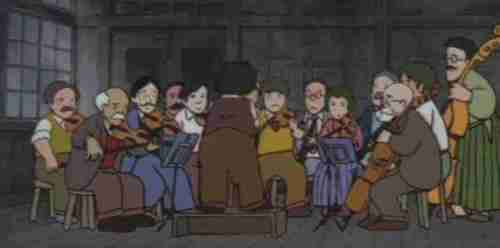
Gauche played cello at the town movie theatre. He had a reputation, however, of not being too skillful. Rather than being "not too skillful," in fact, he was always harrassed by the conductor for being the very worst of all the players.
One afternoon they were all assembled in a circle in the music room, this time practicing the "6th Symphony" to be presented to the town Music Society.

The trumpet was singing with all its might.
The violins were sounding like a two-colored wind.
The clarinet was popping its support.
Gauche was also playing intently, gazing at his music with eyes like saucers and his mouth set boldly.
Suddenly the conductor's hands clapped together loudly. Everyone stopped playing immediately. The conductor roared, "The cello is late! To-tete, teteti; again from that point. And..."
Everyone started playing again from a point just before where they had stopped. Gauche's face was red and his brow was sweaty, but this time he managed to get through what had been pointed out. He sighed with relief and was continuing to play when the conductor clapped his hands together again.
"Cello! You're out of tune. It's annoying. I really don't have time to teach you your scales!"
Everyone looked embarrassed and stared at his own music or fumbled with his own instrument. Gauche hurriedly retuned. In fact, this was not because Gauche was a poor player, but because he had a very poor cello.
"From the previous measure. And..."
Everyone started up again. Gauche twisted his mouth and played with full concentration. This time they got quite a ways. Just as Gauche was thinking things were going well, the conductor clapped his hands together in a threatening way. "Not again," Gauche thought as his heart pounded, but fortunately it was someone else this time. Gauche looked straight at the music in front of him, as though he were thinking about something, as everyone else had done when Gauche had been singled out.
"From where we were, then. And..."
They started up just right, Gauche thought, but suddenly the conductor stamped his foot loudly and bellowed, "No good! That's not it at all! This part is the heart of the music. You make it sound so rough! There are only 10 days left till the performance, everyone. We're supposed to be the experts in music; how can we face anyone if we can't get together and end up sounding like iron-shod blacksmiths or sugar-mill apprentices? You, Gauche-kun! You're a real problem. You can't control your expression at all. You don't show anger, or joy, or any emotion at all. And besides that, you're not quite with the other instruments. It's always like you come shuffling along by yourself after all the others. It's a nuisance--can't you just concentrate? If our glorious Gold Star Orchestra gets a bad reputation just because of you, that will really be too bad for all of us. Well, that's all the practice for today. Get some rest and be in the pit by 6:00 sharp."
Everyone bowed, and then they struck a match to have a smoke or they went off somewhere. Gauche picked up his cello, which looked like a crude crate, and leaned it against the wall. His mouth was twisted and tears rolled down his face, but he pulled himself together and began to play quietly, by himself, the portion they had rehearsed, from the beginning.
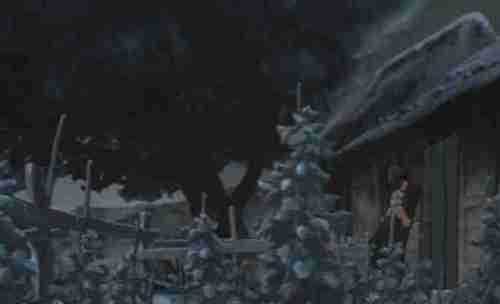
Late that night, Gauche returned to his own house, carrying a large, dark bundle. This "house" was a worn-out mill shack on the riverside on the outskirts of town. Gauche lived there alone; in the mornings he would prune tomatoes and pick off cabbage worms in a small garden plot surrounding the shack, and in the afternoons he always went out. When Gauche got inside, he lit a lamp and unwrapped the dark bundle. It was nothing special--just the cello he had been scraping on that evening. Gauche set it gently on the floor, then abruptly pulled out a cup and gulped down a large amount of water.
Then, shaking his head and sitting in a chair, he began to pull out sheets of music with all the fierceness of a tiger. As he flipped the pages of music, he played thoughtfully, and after playing intently through to the end he started over at the beginning, rumbling through the music time after time.
When midnight had passed he looked as though he was no longer aware himself of what he was playing. His face was red, his eyes were blood-shot, and his expression was unearthly; he looked as though he might collapse at any moment.
Just then there was a tapping at the back door.
"Horche-kun?" Gauche called out, sounding half asleep. But instead, it was a large, tortoiseshell cat Gauche had seen five or six times before that pushed the door open and came in.
The cat carried, as though it were very heavy, a half-ripe tomato taken from Gauche's garden plot. It set it down in front of Gauche and said, "Oh, I'm worn out. All that carrying is terrible."
"What is it?" Gauche asked.
"This is a present," the tortoiseshell cat said. "Please eat it."
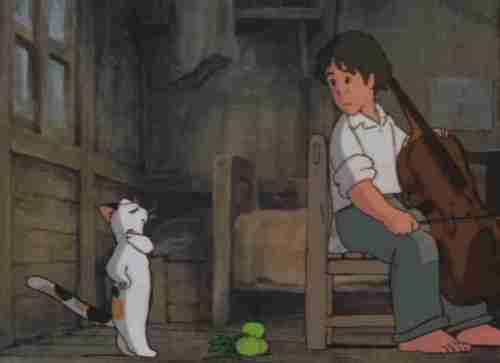
Gauche roared out the irritation he had felt all afternoon. "Who asked you to bring me any tomato? First off, why would I eat anything carried by the likes of you? And second, that tomato is from my garden! And why did you pick it when it wasn't ripe? You must be the one who's been chewing on the tomato vines and pushing them around. Get out, you stupid cat."
"Master," the cat said, "getting so angry will affect your health. Please try playing Schumann's Traumerai instead. I will listen to it for you."
"Don't be so cheeky! Just like a cat!"
The cello player was annoyed, and wondered for a moment what he could do about that cat.
"Don't feel hesitant," the cat said. "Please go ahead. I really don't sleep well if I can't hear your music, master."
"Cheeky! Cheeky! Cheeky!"
Gauche turned completely red and stamped his foot like the conductor had that afternoon, but suddenly his mood changed and he said, "I'll play, then."
With something in mind, Gauche locked the door and closed all the windows. Then he took up his cello and turned out the lamp. The light of the moon in its third quarter filled half the room.
"What did you say to play?"
"Traumerai, a romantic composition by Schumann." The cat wiped its mouth as it spoke.
"Is that that right? Does this sound like your Traumerai?"
For whatever reason, the cello player tore off pieces of his handkerchief and stuffed them tightly into his ears. Then he began to play, with the fury of a storm, a piece of music called The Indian Tiger Hunt.
For a second the cat tipped its head and listened, but suddenly it blinked repeatedly and leapt toward the door. It pounded its body against the door, but the door wouldn't open. The cat was as flustered as if he had met the greatest defeat of its life; sparks shot from its eyes and forehead. Then sparks started from its mouth whiskers and nose; the cat's face itched and twitched as though it were about to sneeze. It raced around as though it couldn't bear the music a moment longer. Gauche was fascinated, and played with increasing vigor.
"That's enough, master! That's enough! For heaven's sake, please stop! I'll never try to direct your music again!"
"Shut up. This is the part where the tiger gets captured."
The cat leapt around in anguish and threw its body at the walls, leaving marks on the wall that shown blue. In the end the cat was spinning around and around Gauche like a pinwheel.
Gauche began to get a little dizzy himself, and finally stopped and said, "Please allow me to stop here."
The cat regained its composure and replied, "Master, there are no words for tonight's performance."
The cello player was annoyed again, but he innocently put a cigarette in his mouth and took out a match. "What is it," he asked. "Aren't you feeling well? Stick out your tongue and we'll take a look."
The cat stuck out a ridiculously long tongue.
"Aha! It's a little rough." As he spoke, the cello player suddenly struck the match along the cat's tongue and lit his cigarette. Shocked, the cat flapped its tongue around like a pinwheel; it staggered to the entry door and began banging its head against it.
The cello player opened the door and watched the cat run out like the wind through the rushes. He laughed. Then, finally relaxed, he slept soundly.
The next evening Gauche again returned home carrying the dark, bundled cello. He gulped down his water and began to play the cello steadily, just as he had the night before. Midnight, one o'clock, two o'clock--Gauche still did not quit. He was continuing his resonant playing with no idea of what time it might be when he heard someone knocking up in the roof.
"Cat! Have you come again?" Gauche shouted, when suddenly there was a flapping sound and a grey bird came down through a hole in the roof. He saw, when it landed on the floor, that the bird was a cuckoo.
"Even birds are coming," Gauche said. "What do you want?"
"I want to be taught music," the cuckoo said with a composed expression.
"Music? Isn't your song just 'kakkou, kakkou?' "
The cuckoo looked very grave and replied, "Yes, that's right. It's very difficult, though."
"What could be difficult? It's terrible how much you birds sing; the singing itself can't amount to much."
"But that's the hard part. For example, singing 'kakkou' like this is quite different from singing 'kakkou' like this, if you listen carefully."
"There was no difference."
"You don't understand, then. Among ourselves, we can sing 'kakkou' 10,000 times in 10,000 different ways."
"You're being willful. If you understand that well, there's no need to come to my place, is there?"
"But I want to do a scale accurately."
"Aren't scales nonsense?"
"I definitely need to do it once before going abroad."
"Aren't foreign countries nonsense too?"
"Master, please teach me a scale somehow. I'll sing along."
"Don't be a nuisance. I'll play it just three times, and when I'm done you have to leave."
Gauche took up his cello and plucked the strings and tuned them. And he played a scale: do, re, mi, fa, sol, la, ti, do. As he did, the cuckoo beat its wings wildly.
"That's wrong! That's wrong--not like that!"
"What a nuisance! You try it yourself, then."
"It's 'kakkou.' " The cuckoo struck a pose with its body pushed forward, and then sang, "kakkou."
"What on earth? Is that your scale? In that case, the scale for you is the same as in the 6th Symphony."
"It's different."
"What's the difference?"
"The difficult thing is to repeat it many times."
"Like this, in other words." The cello player took up his cello again, and went on playing, "kakkou, kakkou, kakkou, kakkou."
The cuckoo was overjoyed at that. It joined in, singing, "kakkou, kakkou, kakkou, kakkou." It put all the more effort into its posture, and kept on calling out.
Eventually Gauche's arms got sore; he said, "well, that's enough of that" and stopped playing. The cuckoo raised its eyes and looked very disappointed; it sang on for a while, but eventually stopped with a "...kakkou, kakkou, kakkakkakkakka."
Gauche was quite put out, and said, "Listen, bird. If you've finished your business here, please leave."
"Please play one more time. You play well, but it's a little off."
"What do you mean? Amn't I supposed to teach you? Go home now."
"Could you just play it one more time? How about it?"The cuckoo bobbed its head repeatedly.
"Well, then, this is the last time."
Gauche readied his bow. The cuckoo let out a breath: "kukk."
"Please keep going as long as possible," the bird said, and it bowed again.
"I'm sick of it already," Gauche replied with a bitter smile, but he started playing. When he did, the cuckoo twisted its body around and sang out a full-spirited "kakkou, kakkou, kakkou" with all its might. Gauche was irritated at first, but as he played on and on, he came to feel that the bird was truly taken up with its scale. The more Gauche played, the better the cuckoo seemed to sing.
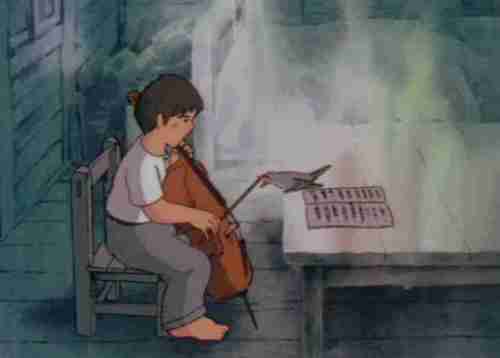
Finally Gauche said, "Hey, if I keep up this foolishness I'll turn into a bird myself," and he stopped playing the cello.
At that, the cuckoo reeled as if it had received a thump on the head; it stopped singing, as before, with a "...kakkou, kakkou, kakkakkakkakka." It looked at Gauche resentfully and said, "Why did you stop? Among us, even the most timid will keep singing out until our throats bleed."
"Don't be so cheeky. How long do you plan to go on with this goofy act? Leave now. Look--the dawn is coming." Gauche pointed to the window.
The sky in the east was tinged with silver, and black clouds were hurrying toward the north.
"In that case, please play until the sun comes out. One more time--just a little more." The cuckoo hung its head even lower.
"Shut up! Don't be so pleased with yourself.! You stupid bird! If you don't leave I'll pluck you and eat you for breakfast!" Gauche stamped on the floor.
Shocked by this, the cuckoo suddenly darted toward the window. It smashed its head against the glass, and fell back down.
"What are you stupid enough to fly into the glass?" Gauche hurriedly stood up and tried to open the window, but this window had never been easy to open. While Gauche was rattling the window frame, the cuckoo smashed into the glass again and fell back down. A glance showed that a little blood was coming from the base of its beak.
"Just wait--I'm opening it now." Gauche finally got the window open two inches (about six centimeters), when the cuckoo rose up again, staring fixedly at the eastern sky as though it would not allow anything to stop him this time, and flew at the window with every bit of strength it possessed. Of course it struck the glass harder than ever, and again fell to the floor, where it was unable to move for a moment. Gauche reached out his hand to pick up the bird and release it through the door, but the cuckoo abruptly opened its eyes and came flying; it was about to smash into the glass again. Without thinking, Gauche raised his foot and kicked out the window. Two or three panes of glass broke noisily, and the window frame fell outside. The cuckoo shot like an arrow out of the now-empty window and kept flying straight to who-knows-where until it was out of sight. Completely fed up, Gauche stared outside for a moment, but then he tumbled to the floor and fell asleep in a corner of the room.
The next evening Gauche was playing the cello until after midnight and drinking lots of water when there was a tapping at the door.
Gauche thought that tonight anything that came should be frightened away, like last night's cuckoo, right at the start, so he armed himself with a cup and took a waiting stance. The door opened slightly and a tanuki pup came in. Gauche pulled the door open wider, stamped his foot, and roared, "You! Tanuki! Don't you know about tanuki soup?"
With a vague expression, the tanuki pup carefully sat down on the floor and tilted his head as if wondering if he had ever heard of it. After a moment he said, "I don't know about tanuki soup."
Seeing that face, Gauche wanted to burst out laughing, but instead he forced himself to look fierce and say, "I'll teach you then. About tanuki soup. You take a tanuki, like yourself, combine it with cabbage, boil them up, and eat it."
The tanuki pup looked surprised and said, "But my father told me that Gauche-san was a good man and not scary, so I should go learn from him." At that, Gauche did start laughing.
"You spoke of learning something. Don't I look busy enough? And on top of that, I'm sleepy."
This motivated the tanuki pup to take a step forward. "I play the small drum. I was told to ask to play along with the cello."
"You don't seem to have a small drum, though."
"Look! I have these!" The tanuki pup pulled two sticks from behind his back.
"What will you do with those?"
"Well then, please play The Jolly Stable Master."
"What is The Jolly Stable Master? Some kind of jazz?"
"Oh, here is the music." The tanuki pup pulled a sheet of music from behind his back. Gauche took it and laughed.
"Hmm, that's a strange tune. But okay, I'll play it. Are you going to play the small drum?" Gauche glanced down to see what the tanuki pup would do, and started playing as he watched.
Using the sticks, the tanuki pup began to beat out the time below the bridge of the cello. And it played quite skillfully; Gauche was impressed.
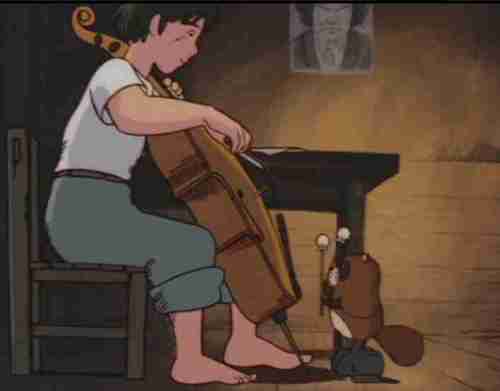
When they had played through to the end, the tanuki pup tilted its head for a moment, thinking. When it had thought things through, it spoke.
"When you play the second string, Gauche-san, you are late. And then I get off, somehow."
Gauche was startled. In fact, he had noticed that evening that no matter how early he played that string, a little time passed before it sounded. "Yes," he said sadly, "that may be so. This cello is a poor one."
The tanuki pup thought for a moment with a concerned look, then asked, "Which part is bad? I wonder. But shall we play it one more time?"
"Right, let's play." Gauche started, and as before, the tanuki pup tapped out the rhythm, occasionally tilting his head to put his ear nearer the cello. When they finished, the sun was brightening the east.
"Oh, it's dawn. Thank you very much." The tanuki pup hurriedly put the sheet of music and his sticks behind his back, held them in place with a rubber band, bowed two or three times, and rushed out.
For a while Gauche stood absently feeling the breeze coming through the broken glass of the night before, but he soon snuggled into his bed in order to sleep and refresh himself before going to town.
The next evening Gauche played his cello through the night again and, as dawn neared, had dozed off still holding his instrument when someone rapped at the door. The rapping was so quiet it could hardly be heard, but because it happened every night, Gauche noticed right away and said, "Come in." What came in through the crack of the door was a field mouse. It scampered over to Gauche, leading a very small child. When the mouse child moved it looked just like a rubber eraser, and Cauche couldn't help laughing. The field mouse looked around nervously, wondering why it was being laughed at, but it placed a green chestnut in front of Gauche and bowed formally before speaking.
"Master, my child is in poor condition and is about to die. Please take pity and cure him."
"Am I a doctor or something now?" Gauche said, slightly offended. The mother field mouse hung her head in silence for a moment, and then resolved to speak again.
"Master, that is not right. You skillfully cure everyone's ills every day, do you not?"
"I don't know what you're talking about."
"But master, thanks to you the rabbit's grandmother recovered, the tanuki's father got better, and even that ill-tempered owl was cured, and so it is too cruel that you won't help my child alone."
"Now, now! This must be some kind of mistake--I haven't cured any owl's illness. Just the tanuki's son came last night and we played at being a band. Really!" Gauche looked down at the field mice in amazement and laughed.
The mother field mouse began to cry.
"If my child is to become sick, I suppose the younger the better. That 'gou, gou' sound could be heard until just a while ago, but it stopped just as my child became sick, and no matter how I pleaded after that, you would not make the sound for us. What an unfortunate child!"
Gauche raised his voice in surprise. "What, do you mean the owl and the rabit were cured when I played the cello? Is that what you're saying?"
The field mouse wiped her eyes with one paw and said, "Yes, around here when we get sick, everyone goes under the floor of your house, master, to be cured."
"And then they are cured?"
"Yes, their blood circulates throughout their bodies; they feel extremely well and are cured right away, and they remain cured after returning to their own homes."
"Is that right? I suppose that the sound of my cello resonates, and the vibrations work like a massage to cure your illnesses. Good. I understand! And I'll do it."
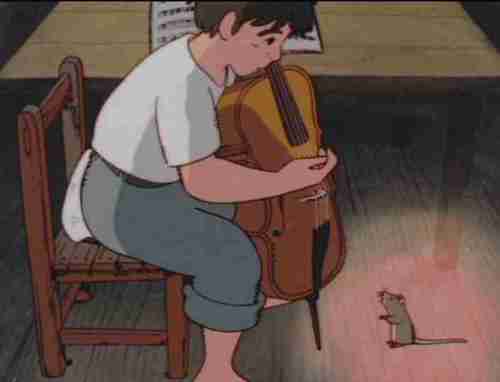
Gauche quickly tuned his strings, then picked up the mouse child and placed it inside the cello through one of the sound holes.
"I will go in with him," the frantic mother mouse said as she jumped onto the cello. "That is done at hospitals everywhere."
"I wonder if you can get in." The cello player tried to pass the mother field mouse through a sound hole, but only half its face would fit in.
The field mouse flailed about, and called to the child inside. "Are you all right in there? When you fell, did you pull your feet in and drop skillfully like I always taught you?"
"Yes. I dropped all right." The mouse child replied from the bottom of the cello in a tiny voice like that of a mosquito.
"He'll be okay. So no crying." Gauche put the mother mouse down, picked up his bow, and began playing a sonorous rhapsody or something.
The mother mouse listened to the sounds with a worried look, but finally could contain itself no longer and called, "That's enough! Please let him out."
"Really? Is that all right?" Gauche tipped the cello and put his hand over the sound hole, and in a moment the mouse child was out. Gauche put it down without speaking. Its eyes were shut tight, and it was shivering.
"How are you? Are you all right? How do you feel?"
For a moment the mouse child did not reply, but kept its eyes shut and shivered. Then it suddenly jumped up and started running.
"Oh! He's all right! Thank you very much. Thank you very much." The mother mouse ran beside the child, but when they were in front of Gauche, it bowed formally and said, "Thank you very much; thank you very much" over and over.
With casual amiability, Gauche asked, "Say, do you two eat bread?"
The field mice seemed surprised, and looked around nervously. "No," the mother said, "we've heard that bread is made by kneading and pushing wheat flour and that it swells up and is delicious, but whether that's true or not, we have never gone into your cupboards, and we would never do such a thing now that you have been so much help to us."
"No, that's not what I meant. I just asked if you could eat it. And I think you can. Wait a minute. I have something for your hungry child."
Gauche placed his cello on the floor and took a pinch of bread out of the cupboard and placed it in front of the mice.
The field mice cried and laughed and bowed as though they had lost their senses. Finally they carefully picked it up and went outside, the mouse child leading the way.
"Ah. Talking with mice wears me out." Gauche flopped down on his bed, and was soon noisily asleep.
One evening six days later, the flush-faced members of the Gold Star Orchestra were finally moving, one by one with their instruments, to the waiting room behind the hall of the town's civic auditorium. They had played the 6th Symphony well from start to finish. A storm of applause continued in the hall. The conductor was ambling among the others with his hands stuffed in his pockets as though he didn't care one way or the other about the applause. But in fact, he was filled with happiness. The others were striking matches for their cigarettes, or putting their instruments back in the cases.
In the hall, the sound of clapping continued. It was not dying out, but was gradually growing stronger, to an almost frightening level. The master of ceremonies, wearing a broad, white ribbon across his chest, came into the waiting room.
"They're calling for an encore--won't you please play something more, even if it's just a short piece?"
The conductor replied resolutely. "That's impossible. I'm not going to ruin the mood by passing something off after such a grand work!"
"Can't you just make some brief remarks, as the conductor?"
"It's out of the question. Hey, Gauche-kun! Go out there and play something."
"Me?" Gauche was speechless.
"You. Yes, you," the first violin suddenly said, raising his head.
"Well, get out there," the conductor said. The others pressed the cello into Gauche's hands, opened the door, and pushed Gauche out onto the stage. Holding his worn-out old cello, Gauche was thoroughly embarrassed, but when everyone saw him come out on stage they clapped all the harder. Some even cheered.
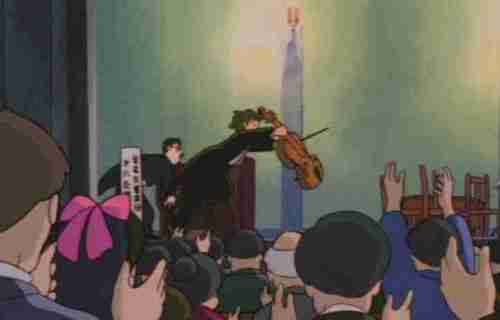
Gauche settled himself and walked to the center of the stage, thinking, "How far will people go to make fun of someone? Well, I'll show them--I'll playThe Indian Tiger Hunt."
He then began The Indian Tiger Hunt with the same angry energy he had the night the cat came. This time, however, the audience fell silent and listened enthusiastically. Gauche played steadily on. He passed the point where the suffering cat had emitted sparks. He passed the point where it had repeatedly thrown its body against the door.
When the piece was finished, Gauche took his cello and fled, as the cat had, straight to the music room without looking toward the audience. In the music room the members of the orchestra, and especially the conductor, sat quietly with a fixed gaze, as one does after there has been a fire. Gauche was desperate; he walked quickly through the others, sat down on a couch, and crossed his legs.
Then they all turned their heads and looked at Gauche with straight faces and no sign of laughter.
"This has been a strange evening," Gauche thought. However, the conductor stood up and said, "Well done, Gauche-kun. That music was what it was, but everyone listened in earnest. You've polished up nicely in the last week or ten days. Comparing you ten days ago with the way you played tonight is like comparing a baby with a soldier. If you decide to do something it will always be possible, for you."
All the others stood up and said, "Well done!" to Gauche. Then the conductor turned to the others and added, "No, this sort of thing is possible if your body is strong. An ordinary person would have died."
Gauche returned to his home late that night.
As always, he drank a large amount of water. Then he opened the window and gazed far off in the sky, where he thought some cuckoos were flying.
"Ah, cuckoo!" he said. "I was unforgivable that night. I shouldn't have gotten angry."
Return to Translation Table of Contents
Return to Home Page